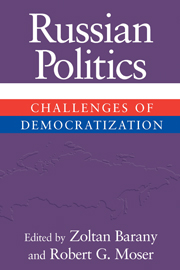Book contents
- Frontmatter
- Contents
- List of Tables and Figures
- List of Contributors
- Acknowledgments
- Introduction: Challenges of Russian Democratization
- 1 Russian Electoral Trends
- 2 Executive–Legislative Relations in Russia, 1991–1999
- 3 The Russian Central State in Crisis: Center and Periphery in the Post-Soviet Era
- 4 Russian Economic Reform, 1991–1999
- 5 Politics and the Russian Armed Forces
- Conclusion: Democracy and Russian Politics
- Index
Conclusion: Democracy and Russian Politics
Published online by Cambridge University Press: 05 June 2012
- Frontmatter
- Contents
- List of Tables and Figures
- List of Contributors
- Acknowledgments
- Introduction: Challenges of Russian Democratization
- 1 Russian Electoral Trends
- 2 Executive–Legislative Relations in Russia, 1991–1999
- 3 The Russian Central State in Crisis: Center and Periphery in the Post-Soviet Era
- 4 Russian Economic Reform, 1991–1999
- 5 Politics and the Russian Armed Forces
- Conclusion: Democracy and Russian Politics
- Index
Summary
Russian democracy, as it passes the anniversary of its first decade, is in tatters. Russia cannot be depicted as a fully authoritarian polity. It has many of the components of democracy, including regular elections and a considerable degree of political openness and free competition. Unlike Belarus and Kazakstan, Russia did not slide into the abyss of dictatorship after an initial opening. Unlike Serbia and Uzbekistan, Russia did not drift from one form of harsh authoritarianism to another. Unlike many of its other neighbors, however, such as Poland, Bulgaria, the Baltic states, and Mongolia, Russia fails even to approximate an authentic democracy. The quality of Russian democracy is not only mediocre; it has actually declined since the advent of the new regime in 1991–92.
The first section of this chapter discusses the Russian experience in light of several theories and conceptions of democracy. It establishes criteria for evaluating the quality and character of the post-Soviet political regime in Russia and considers how the Russian experience might speak to issues in democratic theory. The second section offers a causal explanation for the emergence and persistence of what is characterized as “low-caliber democracy.” The quality of popular rule in Russia is traced to a single critical institutional choice and a small set of momentous decisions taken by the chief executive. The third and concluding section of the chapter considers current obstacles to democratization in Russia and makes explicit the prescriptions for change that follow logically from the causal analysis.
- Type
- Chapter
- Information
- Russian PoliticsChallenges of Democratization, pp. 215 - 252Publisher: Cambridge University PressPrint publication year: 2001
- 2
- Cited by



